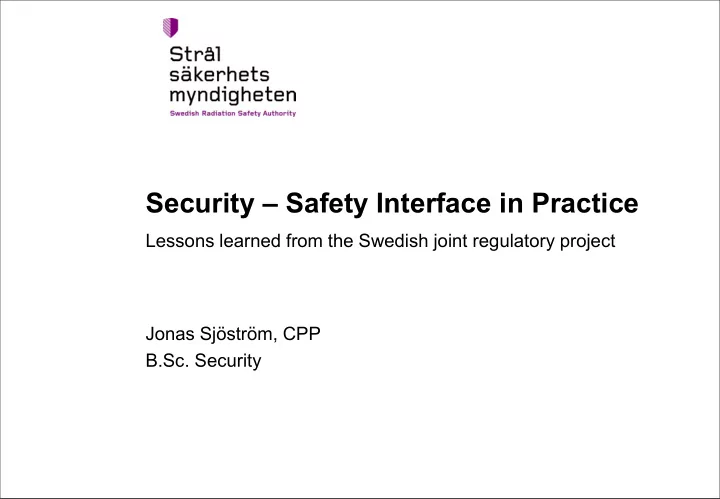

Security – Safety Interface in Practice Lessons learned from the Swedish joint regulatory project Jonas Sjöström, CPP B.Sc. Security
Background to the regulatory situation 2008 Swedish Nuclear Power Inspectorate
The new regulatory approach Legislation: EU legislation, Environmental Code, Nuclear Activities Act/ordinance, Radiation Protection Act/ordinance Regulations: 1. Jointly for all Basic Regulations for all Licensable Activites involving activites Ionizing Radiation Level of details Regulations on Regulations on Regulations on Regulations on Construction Analysis and operations of 2.Facility/activity Decomissioning of Requirements for Evaluation for nuclear Facilites Nuclear Facilites level Nuclear Facilities Radiation Safety for Nuclear Facilities Regulations on specific Regulations on 3.Specific Radiation Safety Information Security for ex Aspects nuclear facilities aspects
Structure of Regulations (Construction of NPPs) Ch.1 Application and Definitions Ch.2 Generic Requirements – Risk profile – Defence in depth and barriers – Organization, Command & Control Ch.3 Requirements on facility and functional level – Fundamental radiation safety functions – Radiation safety classification – Emergency preparedness – Waste and decommissioning – Multiple facilities on the same location
Structure of Regulations (Construction of NPPs cont) Ch 4 Requirements on specific construction solutions – Reactivity control – Heat removal – Reactor containment and shielding of sources – Fuel and core – Preassure and load bearing SSC – Power supply – Control room – Physical protection – Fire protection – Spent fuel pool – Ventilation
Examples of S&S interface Evaluation and analysis of all initiating events that might pose a threat to the safety of the reactor – Internal events – Internal hazards – External hazards – Malicious acts
S&S interface (cont) Identify anticipated events and conditions Categorise and divide into event classes (plant states) Analyse and assess development over a certain period of time Analyse and assess the resulting radiation protection impacts against design criteria, in terms of doses to workers and general public and releases to the environment
S&S interface Design basis Plant Construction threat levels state/Event Criteria, mSv class (H1-H5) (existing reactors) - H1 DBT1 H2 1 DBT2 H3 10 DBT3 H4A 100 DBT4 H4B 100 DBT5 H5 100TBq Cs137
Example of a provision “ §53 A nuclear power reactor should be constructed with a physical protection system that enables the continuous operations of the fundamental safety functions during security events from H2-H5. The physical protection system should be constructed with: A limited access area • Protected areas within the limited access area, and • Vital areas.. ” •
Implications for security Language – Swedish got one word for safety and security – Use of terms – DiD, Barrier etc – ” Safetyfication ” of security terminology Integration in a shared publication – No stand-alone security publication -Lack of visibility? Internal cooperation – allocation of resources and priorities Competence – New way of regulating and inspecting
Conclusion Holistic approach to the overall safety of the reactor All regulatory requirements together based on characteristics as opposed to subject matter Security/safety interaction and interdependability enhanced through the joint approach Focus on what we have in common as opposed to our differencies Acknowledge and respect the differencies!
Thank you! jonas.sjostrom@ssm.se
Recommend
More recommend